Amrita Vishwa Vidyapeetham has implemented various systems to track student performance and graduation likelihood. These tools allow us to monitor and compare the participation and performance of women and men. Additionally, we have introduced several support schemes, including remedial measures for students facing academic challenges. These programs are available to all students, with some specifically designed to address unique challenges faced by women. This approach enables us to address and reduce any potential gender-based performance gaps.
The effectiveness of these initiatives is reflected in our female graduation rate, which has consistently remained above 90% since 2019-20, reaching 92% in 2023-24 (+1% compared to last year).
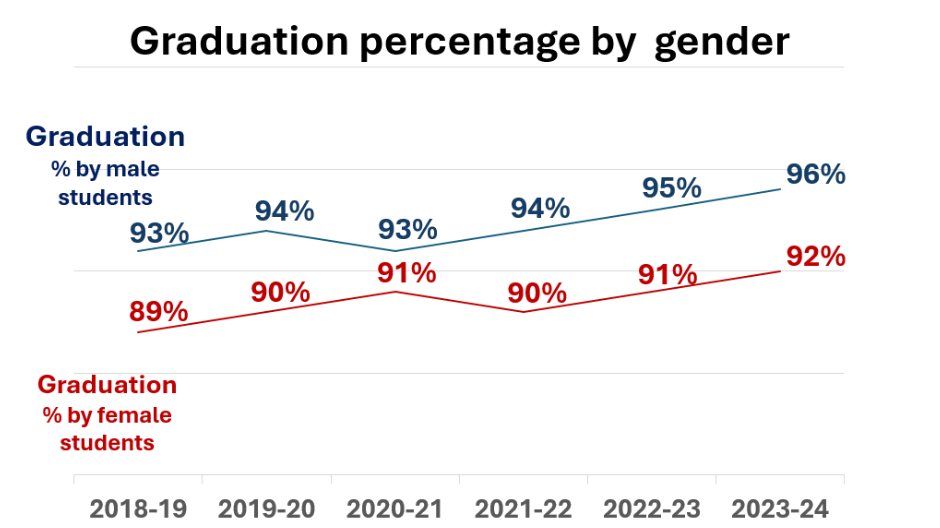
All students, teachers, and parents can track student’s progress from a management system “AUMS” at any time. This proves to be a very valuable tool to track the progress of female students.
Amrita has developed an integrated world-class University Management System which includes an e-learning platform, Amrita Vidya, web-based software for effective management of learning services.
AUMS supports all the major institution-wide administrative and academic services including admission module, administration module, academics module, accounts module, examination module, library, research, rankings, accreditation to name a few.
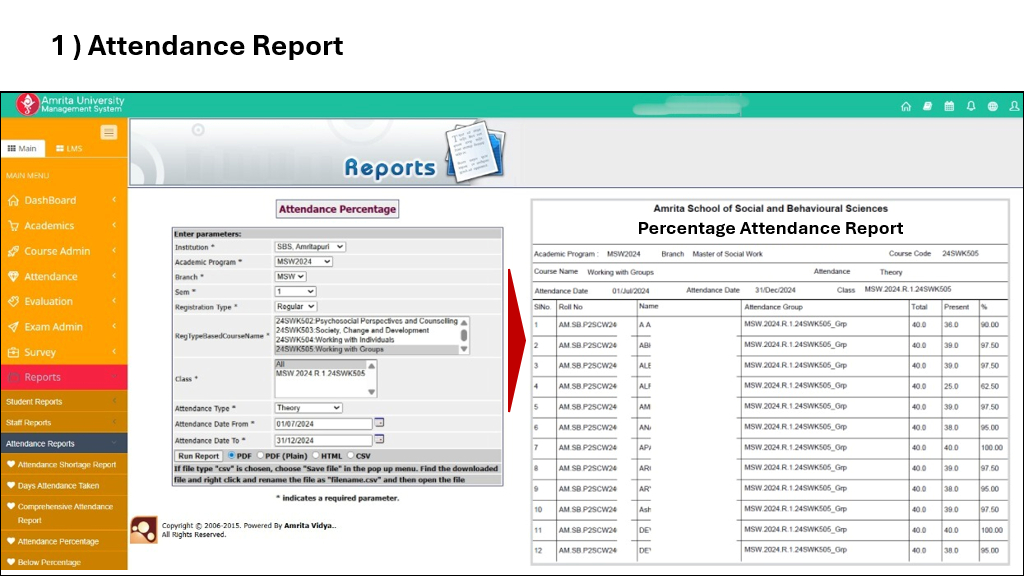


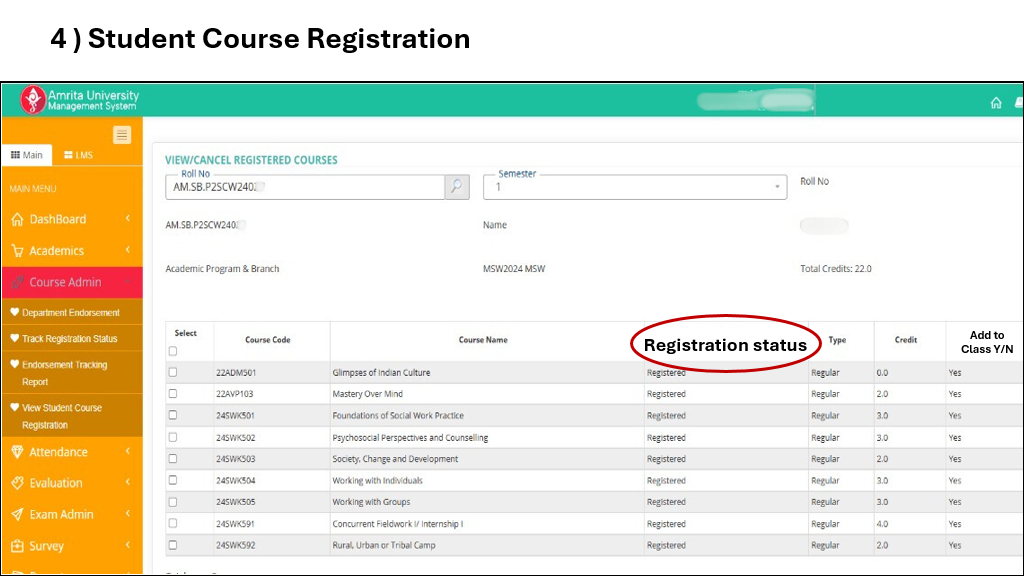
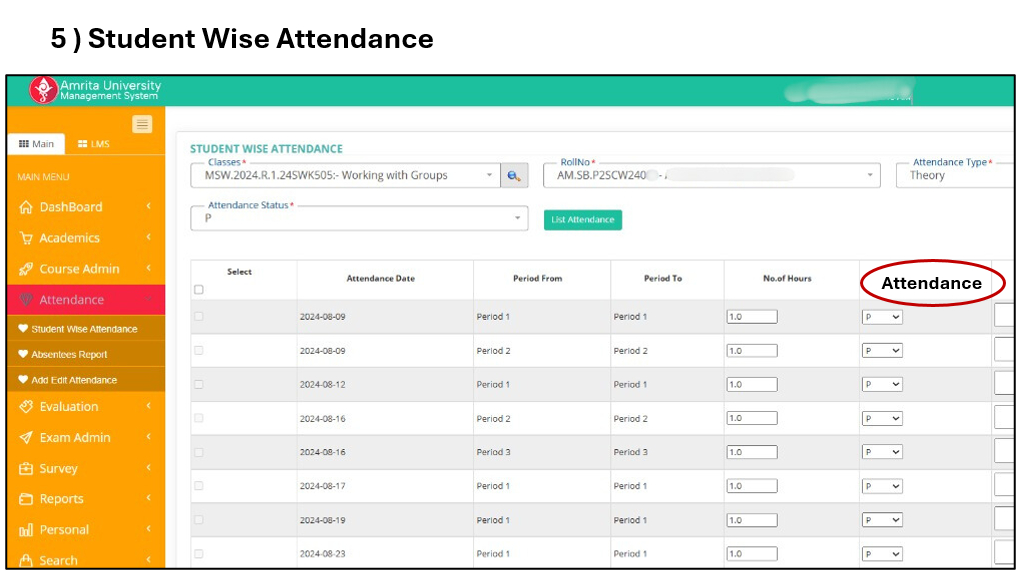
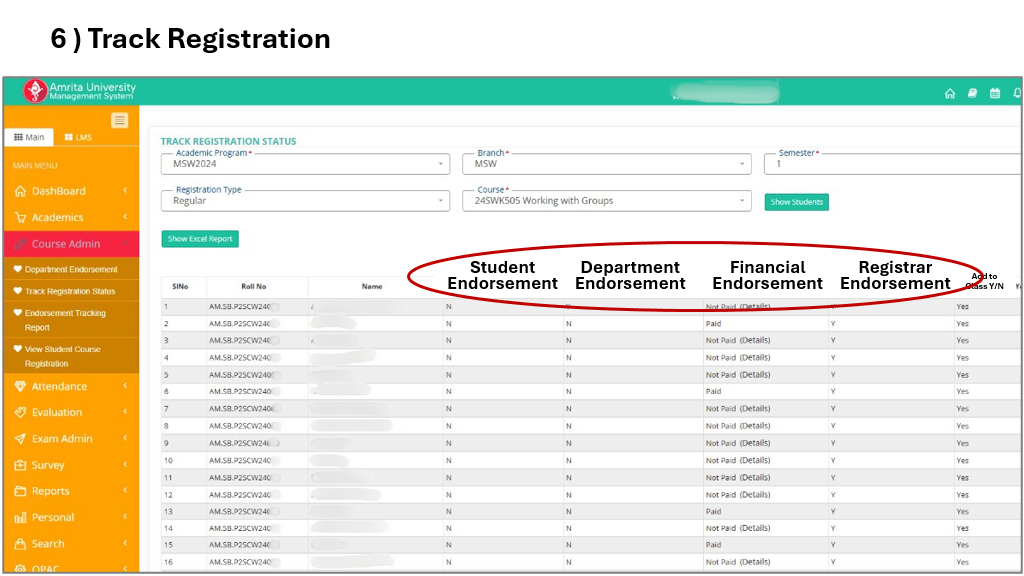
Parents can register to monitor their children’s academic progress and view additional aspects of their life at Amrita Vishwa Vidyapeetham. The registration and authentication process consists of three steps, detailed in the Registration Help Document.
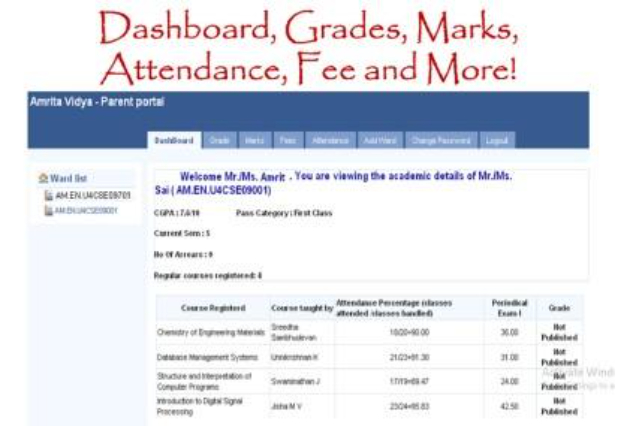
If parents do not have an ID, they need to follow a 3-step process to register



In order to (i) guide students in planning their courses of study, (ii) advise them on academic programmes and (iii) monitor their progress, the departments will assign a batch (class) of a certain number of students to a faculty member, who will be designated as their Class Counsellor (usual ratio is 1 for 20 students). One among the Counsellors shall be designated as the Faculty Advisor, who shall coordinate the functions of the Class Counsellors.
If students need further help, they can approach the students’ counsellor (psychiatrist) available at their campus. Class Counsellors can thus pay special attention to the progress and studies of female students and notice any issue they may be facing.
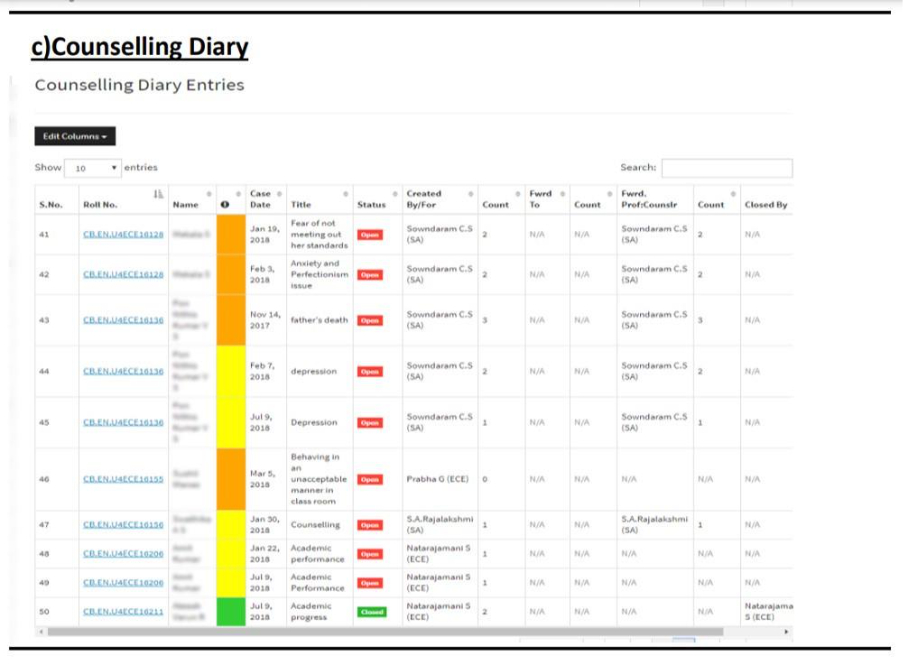
Our female students can request mentorship on critical personal and academic issues from women in top management and senior faculty counselors at Amrita Vishwa Vidyapeetham. This mentorship is usually reserved for complex topics that typically cannot be addressed by class counselors. This access to female top management offers many advantages to our female students:
Role Modeling and Representation: Seeing women in leadership helps them visualize themselves in similar roles, breaking down internal and societal barriers that may otherwise discourage them. These mentors serve as proof that leadership positions are attainable, particularly in areas where women are underrepresented.
Targeted Guidance and Insights: Women leaders can offer unique perspectives on navigating professional challenges, especially those related to gender. This includes handling stereotypes, balancing work-life dynamics, and overcoming biases. Mentors from top management understand both the industry and academic landscape, offering tailored advice that accounts for these challenges.

Building Confidence and Resilience: Mentoring relationships help build self-confidence. Female mentors who have navigated the paths to senior management provide valuable guidance on resilience and self-advocacy, encouraging students to build their confidence in managing personal and professional challenges.
Networking and Opportunities: Mentors often help students expand their professional networks, introducing them to other influential figures in their fields. This access can lead to internships, job opportunities, and collaborations that may not be easily accessible otherwise.
Encouragement for Lifelong Learning: Mentorship can instill a passion for continual growth, encouraging students to pursue further learning and development. This is one of the goals set by the Chancellor of Amrita Vishwa Vidyapeetham for education. Seeing their mentors’ commitment to education and professional development can inspire our female students to adopt the same dedication to their careers.

Testimony of Dr Parvathy V., Chair of the Social Sciences Department, narrating the continuous mentoring guidance of the Chancellor Amrita Anandamayi Devi since her BSW, and Bri Deepthi, a PhD student, on her conversation with Dr. Maneesha V. Ramesh, Provost Amrita Vishwa Vidyapeetham.
“It is with immense pride and gratitude that I share the exceptional opportunities I received as an Amrita alumnus during my undergraduate, postgraduate, and PhD studies at Amrita. One of the most significant opportunities was the direct guidance and mentorship of our esteemed Chancellor, Dr. Sri Mata Amritanandamayi Devi. Having direct access to her wisdom and expertise is a rare privilege, and it has been a highlight of my time at Amrita.
During my undergraduate studies, the Chancellor’s projects and initiatives, particularly the community outreach programs, inspired me. Her personal guidance and mentorship extended beyond academics, shaping my extracurricular and co-curricular activities, which were closely linked to societal service and community-benefiting projects.
The Chancellor’s mentorship continued throughout my postgraduate program in Master of Social Work, where she provided academic and emotional support, significantly influencing my performance and mental well-being. Her guidance also played a pivotal role in my PhD research, ensuring its successful completion. Having a female mentor with expertise and compassion is invaluable for women like me.
I am deeply grateful for the unwavering support I received from the academic and management teams at Amrita.” Dr Parvathy V
“As a PhD scholar at Amrita Vishwa Vidyapeetham, working under the guidance of Dr. Maneesha V. Ramesh, Provost of Amrita University, Dean of the School for Sustainable Futures and UNESCO Chair on Experiential Learning has been a truly transformative experience. Her visionary leadership in IoT, AI-based landslide early warning systems and sustainable development, combined with her hands-on mentoring approach, has deeply influenced my research outlook. Dr. Maneesha’s vision of integrating interdisciplinary research—spanning computer science, earth sciences, and sustainability, reflected through initiatives like Live-in-Labs® and Jivamritam—has shown me how research can directly uplift communities while advancing scientific innovation. What inspires me most is her ability to combine deep technical expertise with compassion and purpose. Dr. Maneesha is not only an exceptional scientist but also an inspiring role model who empowers her scholars to think innovatively, work collaboratively, and pursue research with social purpose. Her constant encouragement, technical insight, and empathetic guidance make her a true pillar of academic and personal growth. Dr. Maneesha’s mentorship has shown me that with the right guidance, research can go beyond publications to create real-world impact—a lesson that continues to motivate me every day, which has eventually shaped my academic journey.” – Bri Deepthi (Vipina Valsan)
2.3.1 Mentoring feedback
Mentorship is critical for student success, especially for women who may face unique academic and social challenges. Amrita Vishwa Vidyapeetham continuously evaluates its mentorship programs to ensure their effectiveness and identify areas for improvement. Feedback and testimonies from students are regularly collected to assess the quality and impact of mentoring. In 2024, several such feedbacks were gathered and recorded. For instance, Priyadarshini V, an MBA Finance student at the Coimbatore campus, shared her mentoring experience, which helped her secure a position at Grant Thornton as a Tax Analyst.
Read More
2.3.2 Exit survey for graduated students and long-term feedback from Alumni
Exit surveys for graduating students are powerful tools for understanding the full student experience and identifying systemic barriers that might still exist. They offer direct insights into what aspects of their education helped or hindered their success.
In 2024 we conducted an alumni survey for the students from the 2023 batch, and made several analysis based on gender, overall feedback on Amrita, index of satisfaction, time to employment etc.
Conducting follow-up surveys or interviews with women alumni provides valuable long-term insights into the impact of their education and the challenges they may face post-graduation. This feedback helps identify if certain skills, resources, or support mechanisms could enhance the long-term success of future students.
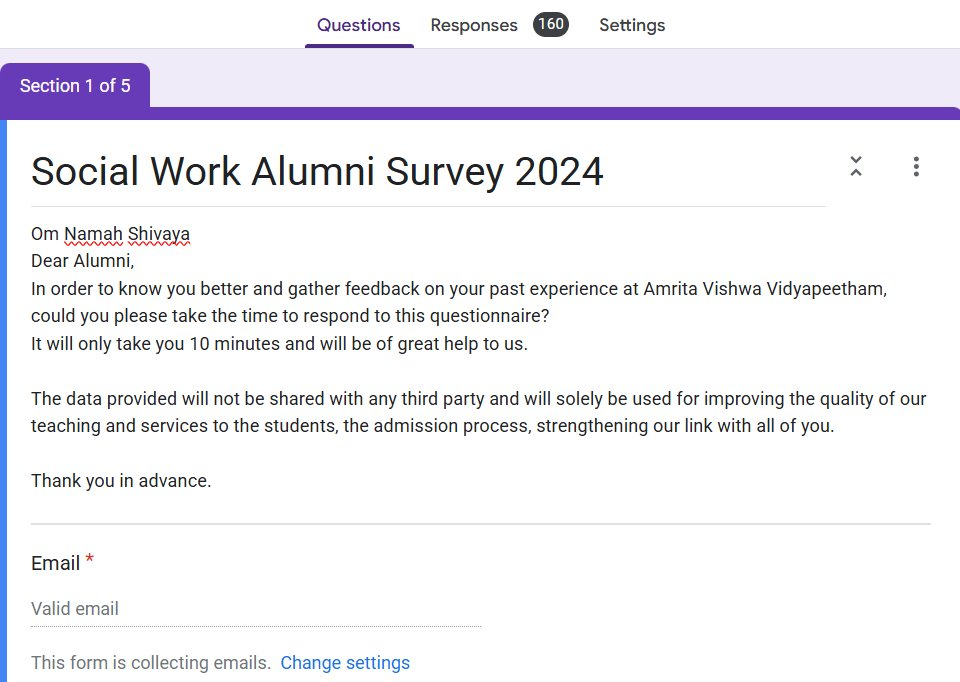
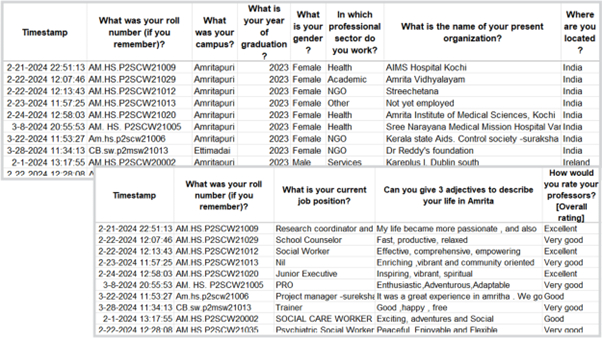
Should a student fail in an examination, several remedial provisions are made available to support them. Considering the specific challenges faced by female students during the course of their study, their case may receive particular consideration when evaluating available solutions.
Students, who fail or secure an “F” grade in a non-semester course (i.e. courses not offered in the ongoing semester), can apply to write supplementary examinations for the course during the prescribed schedule from the Examination Office, paying the prescribed fee.
Students who have secured an ‘F’ grade in a course may take the supplementary examination for a maximum of three additional attempts (excluding the end-semester examinations) with the same internal marks awarded in their immediate previous exam. If students exhaust all three additional attempts, they will appear for their supplementary exam for the entire 100 marks. The internal marks will not be applicable.
If students wish to improve their internal marks, they can do so by re-registering for the course by choosing any of the appropriate remedial options. In this case, the internal marks obtained by the student will be valid for the end-semester of the reregistered course with three more supplementary attempts.
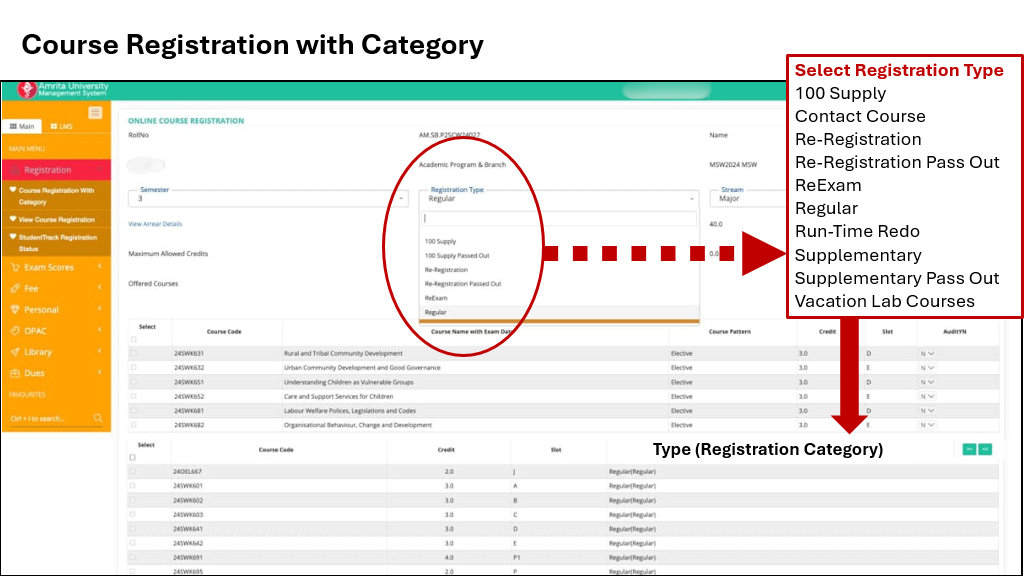
Remedial options are offered to enable students, including women, to complete the dropped courses or clear the failed courses. Remedial options described in this section are primarily offered to help students improve their internal assessment marks.
In such cases, course counsellors and mentors are available to exchange with the families, including doing several rounds of discussions, in order to help them analyze the existing options so that students feel supported and do not discontinue their education.
Example of Coimbatore Student Affairs and Welfare: Click here
For further information on the scholarships offered specifically to women: Click here
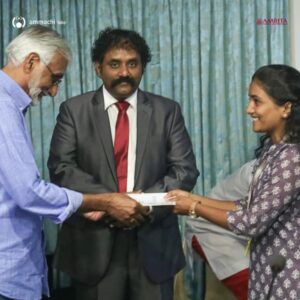
This is the reason why Amrita is committed to providing a safe campus for all students, especially, girls, to facilitate safe travel between the buildings and provide robust infrastructure with adequate lighting. Amrita provides girls’ hostels on all its campuses with strict regulations to protect female students.
Example of hostels’regulation for Coimbatore campus: Click Here

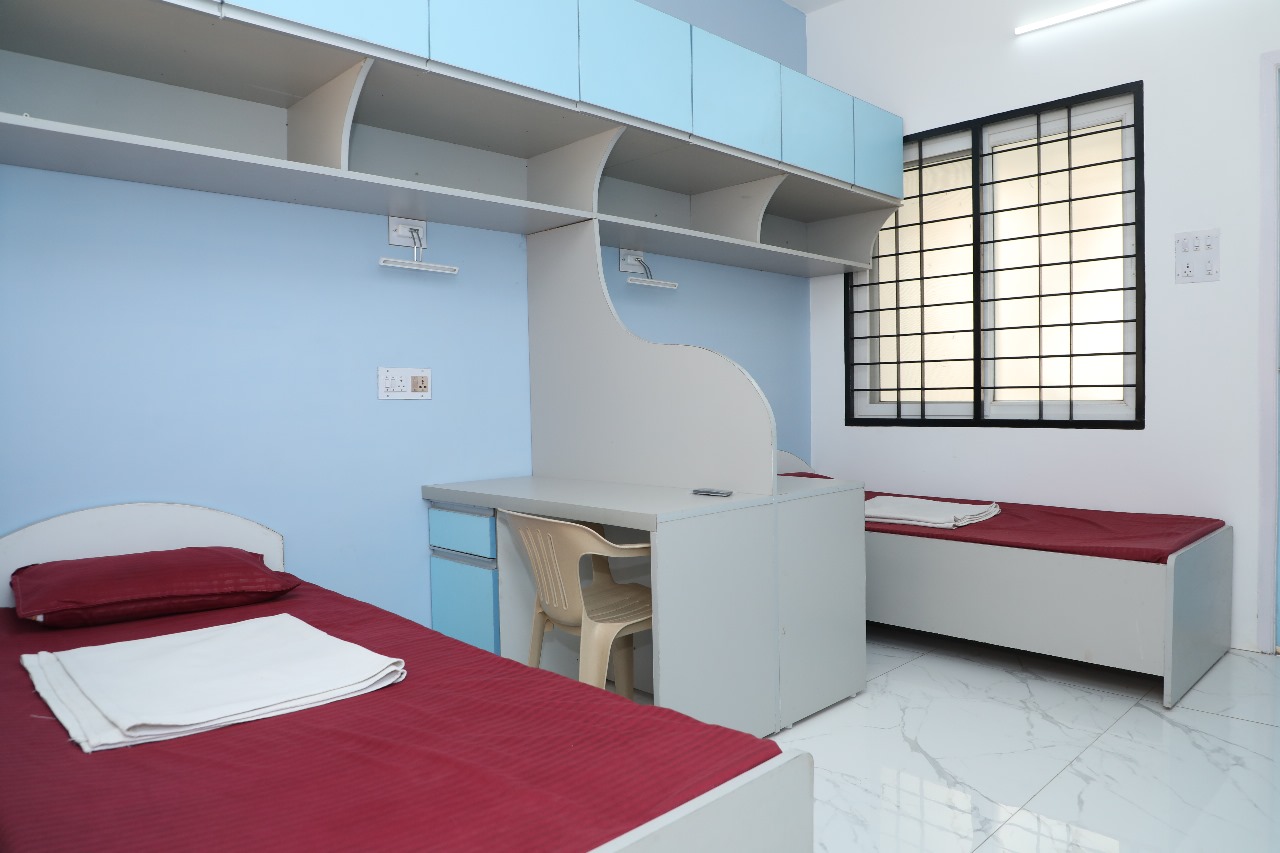
Amrita Vishwa Vidyapeetham buses are available for transporting students and staff from the city and suburbs to the college in all its campuses. Example of commuting route for bus services at Coimbatore: Click here
For gender equality & gender justice in all its interventions & practices, women students can contact the Women’s Complaints and Redressal Cell. The cell is formed to resolve the women’s grievances regarding gender discrimination and sexual harassment complaints of its students.
The faculty, students, and staff who have a grievance to report, can contact any of the committee members listed online or can send their grievance to the mail id grievance@am.amrita.edu. A committee exists in each campus. For a better listening and target the issue different sub-committees have been created.
For further information: Click here
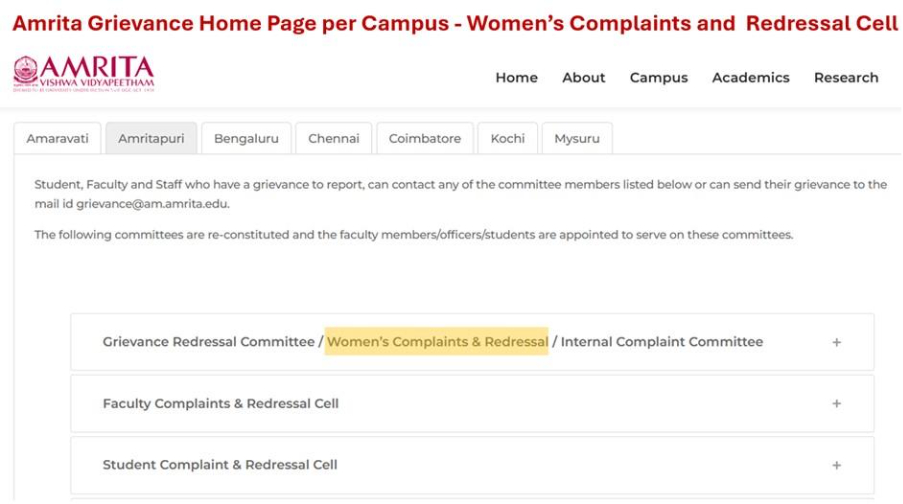
In addition to its current tracking measures, Amrita Vishwa Vidyapeetham is going a step further by organizing global events and gathering best practices from other institutions in India and around the world. This allows us to keep our tracking system aligned with best practices and standards.
In 2023, as part of Civil20 India—the official G20 Engagement Group chaired by the Chancellor of Amrita Vishwa Vidyapeetham—we compiled and published 64 best practices (Udaharans) for the C20 Summit in Jaipur on July 31, 2023, related to gender equality and women’s empowerment, with some of them directly focusing on the importance of systematically tracking, monitoring, and evaluating women’s performance and graduation. This was the case of an initiative called Manzil, striving to improve adolescent girls’ vocational and economic potential in Rajasthan. The project’s primary strategies include systematic tracking, through the monitoring of enrollment and completion rates via a dashboard to measure impact and drive accountability.
For more information (page 29)